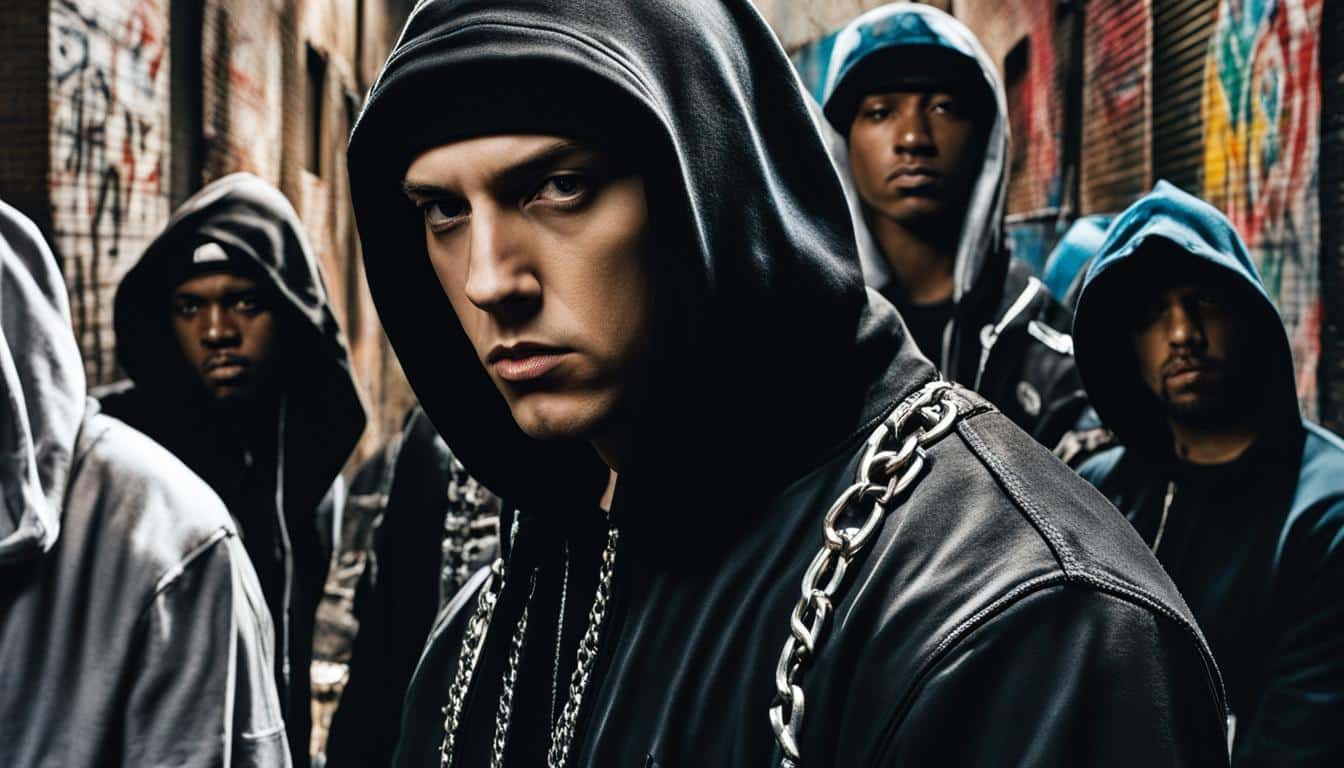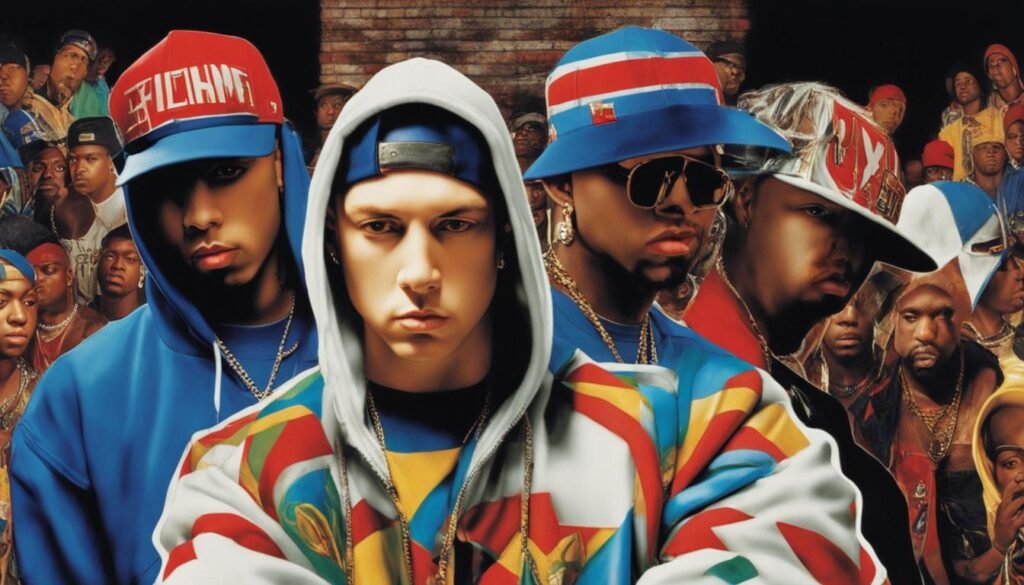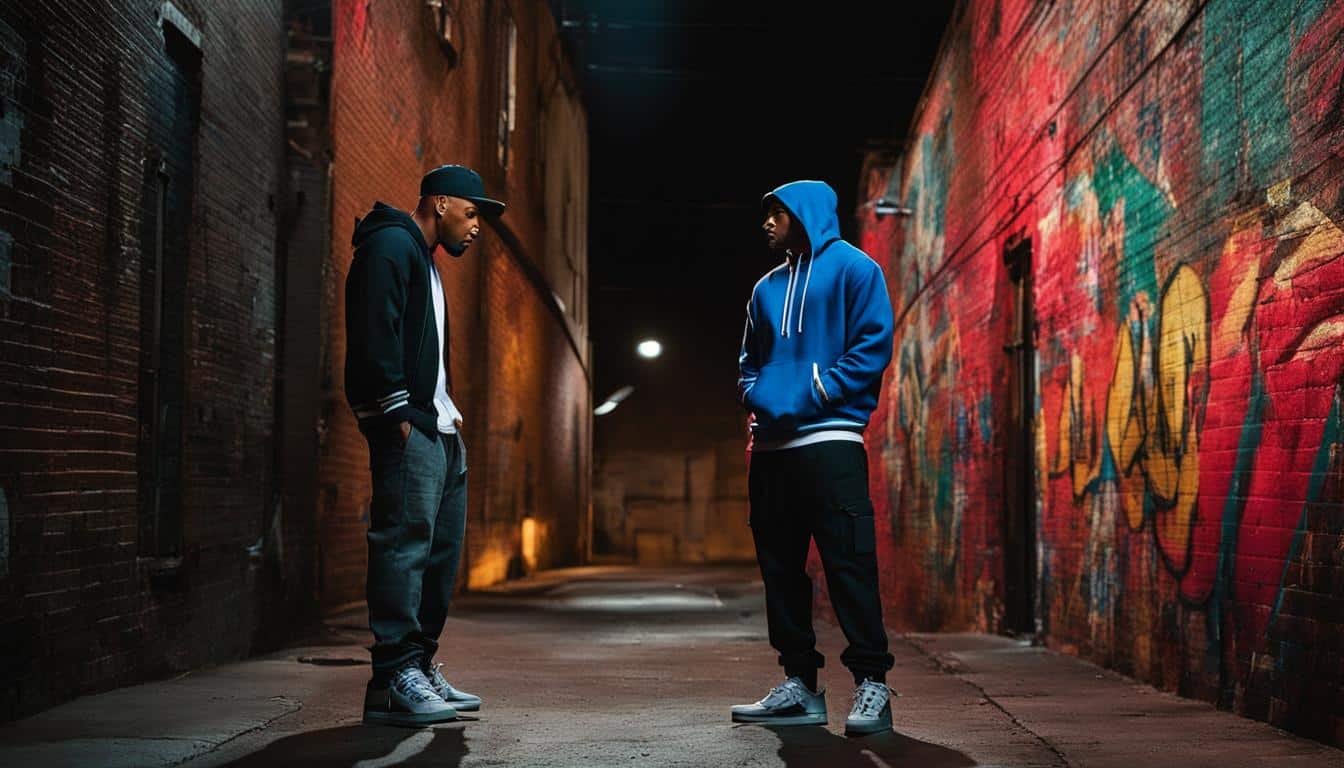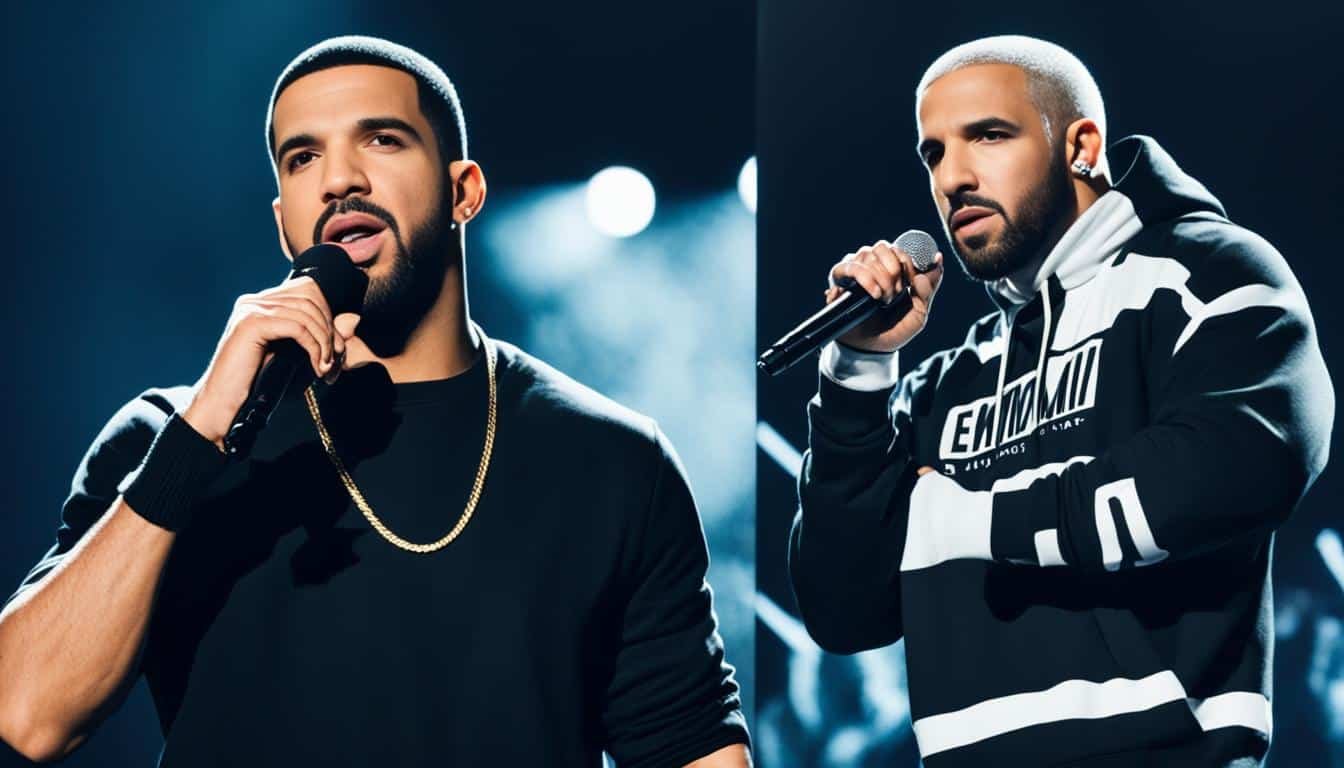What Gang Is Eminem In?

As a fan of hip-hop culture and the legendary lyricism of Eminem, you might have stumbled upon the question: What gang is Eminem associated with? Despite the swirling rumors and the gritty portrayal of street life in his rhymes, the thread of Eminem’s gang affiliation doesn’t hold up under scrutiny. Diving into Eminem’s gang history, it becomes clear that Marshall Mathers, better known by his stage persona Eminem, has defied the odds of his upbringing without the backing of any gang.
While the rumor mill might spin tales about Eminem’s gang, the Detroit rapper’s trajectory from humble beginnings to rap superstardom lacks the concrete evidence or a reliable source to confirm these tales. Despite the often-dark content of his music, Eminem and street gangs don’t share the affiliation that many presume. No legitimate reports or claims have placed Eminem in a gang context, which directly opposes the assumptions made by some of his more controversial lyrics & narratives.
Eminem’s Public Persona and Gang Affiliations
When you think of Eminem, his image as a battle-hardened MC from Detroit comes to mind; a persona cultivated from his in-your-face lyrics and tough demeanor. But how much of this translates into real-life connections with gang culture? Let’s delve into the reality behind the myths.
Breaking Down Eminem’s Street Cred
Eminem’s street cred is not just for show; his upbringing and musical narratives are genuine reflections of his experiences in the hardened streets of Detroit. While he raps about the complexities of street life and urban decay, it’s important to understand that his ties to these themes are deeply personal and artistic. The harsh environments depicted in his tracks resonate with many, bolstering his authenticity in the hip-hop community.
Rumors vs. Reality: Assessing Eminem’s Alleged Gang Connections
Yet, as you sift through Eminem’s verses and statements, it becomes apparent that his fame is not due to any affiliation with criminal organizations. Eminem himself has been vocal about distancing his narrative from that of actual gang involvement. Despite the **eminem gang connections** rumors, close examination shows that his art does not imitate a life of crime. Eminem’s rapport with fans and within the hip-hop industry remains untainted by the shadow of criminal associations, focusing instead on his impact as a groundbreaking artist.
Understanding Gang Culture in Hip-Hop
When you dive into the history of hip-hop, you’ll find that the genre has always had an intricate relationship with gang culture. Many legendary artists come from backgrounds where gang affiliations are interwoven with the fabric of their communities, often using music as a form of expression and escape. **Eminem’s gang history**, a topic of fascination and debate, however, doesn’t align with the traditional narrative we see in hip-hop.
Rumors surrounding **Eminem’s gang membership** have circulated for years, casting a shadow of mystery over his storied career. Yet, upon closer inspection, your understanding of Eminem’s lyrics and persona reflects a struggle with identity and survival rather than any claims of actual gang affiliation. The conversation about **Eminem and gang rumors** speaks more to his ability to embody the raw energy and protective mechanisms that are often associated with gang culture, rather than any real connection to it.

The truth is, while Eminem is no stranger to exploring darker themes within his music, he does so without asserting a gang identity. This sets him apart from some of his peers for whom gang life has directly influenced their artistry. Eminem’s narrative is a complex one, filled with emotional storytelling and an exploration of personal demons, delivered through the lens of a performer who has seen and felt the ripple effects of gang culture, without becoming a direct part of it.
Your appreciation for Eminem’s work becomes richer when acknowledging the skill with which he dissects and portrays the challenges of street life, simultaneously separating himself from the factual implications of those very struggles. In the end, the conversation around Eminem tangentially touches on hip-hop’s broader connection to gang identity, but fails to find grounding in his personal life story or creative intentions.
Eminem and D12: Music Group or Gang?
If you’ve ever found yourself asking, “What gang is Eminem in?” then you’re likely familiar with the gritty Detroit narratives that have shaped Eminem’s rap legacy. However, it’s crucial to draw a line between creative expression and real-life affiliations. When you explore the roots of D12, a group also referred to as The Dirty Dozen, it becomes evident that the collective, including artists like Bizarre, Kuniva, and of course, Eminem himself, is a product of musical camaraderie, not gang culture.

Origins of D12 and Eminem’s Role in the Collective
The narrative of D12 began with the visionary Detroit artist Proof, who aimed to unite the city’s rapping talent. Eminem’s ascent within the group followed the tragic loss of member Bugz, and as the world knows, his presence was a catalyst in thrusting D12 into the international spotlight. Although Eminem assumed a leadership role, it was clear that D12’s formation was a unification of peers dedicated to showcasing their artistry, rather than a front for any illicit activities.
D12’s Influence on Eminem’s Career and Public Image
Eminem’s journey with D12 undeniably intertwined with his solo endeavors, contributing to the complex narrative of Eminem and gang culture. D12’s music was replete with raw insights into the challenges they faced, which, although often abrasive, were steeped in the desire to uplift and relate, rather than to glorify any form of gang association. Eminem’s public image, while shaped by his involvement with D12, stands alone as a testament to an artist’s ability to draw inspiration from his environment, transforming potential gang stereotypes into a powerful, singular voice in hip-hop.
Eminem’s Lyrics and the Perception of Gang Affiliation
When you dive into Eminem’s lyrics, it’s like entering a vivid tapestry of urban struggle, painted with words that echo the harsh realities of street life he witnessed. This poetic canvas often depicts scenarios steeped in violence and adversity, which has led some to question eminem gang affiliation. Yet, it’s important to grasp that Eminem’s exceptional storytelling is built on complex characters and scenarios, much like a novelist might spin a web of fiction to convey a deeper truth.
The narratives spun by the Detroit wordsmith might resemble the confessions of gang involvement, but in reality, they are Eminem’s way of reflecting on the world he’s seen, not the life he’s lived. Through clever wordplay, multi-layered alter egos, and cinematic scenarios, Eminem has articulated experiences that, while mirroring truths for some, are not direct expositions of eminem’s gang membership.
Eminem stands as a prime example of where art and reality diverge. While he leverages the gritty backdrop of gangsta rap that many of his peers portray with authenticity, his lyrics have remained an exploration, a performance that critiques and illuminates rather than a literal diary of a criminal past. Acknowledging this distinction is crucial in fully appreciating the artistry behind Eminem’s work and understanding his true stance on gang relations and criminal activity.
The Landscape of Detroit Street Gangs and Eminem’s Upbringing
As you delve into the narrative tapestry that Eminem has woven through his music, it’s essential to parse the line between creative storytelling and biography. Detroit, marked by its turbulent history with street gangs and the economic struggles that fuel these groups, provided a backdrop for a young Eminem’s upbringing. The toughness and survivalist mentality that permeate his lyrics often invoke the rumor mill, with speculation about Eminem’s gang affiliations making rounds. Yet, Eminem’s personal denouncement of gang connections underscores a distinction worth noting: inspiration drawn from hardship does not equate to participation.
Eminem’s Childhood Environment and Exposure to Gang Culture
His childhood environment, steeped in the complexities of Detroit’s street scene, undoubtedly influenced Eminem’s artistic vision. Listening to his words, you might find a depiction of life tinted by the realities of gang presence—a brush with the world of gangs, perhaps, but not an embrace. Eminem has vocally denounced any affiliation through his art and public statements, shunning the very notion of Eminem’s gang membership, and in doing so, separates himself from the gang history that haunts many cities like his hometown.
The Reality of Gang Presence in Eminem’s Hometown
The stark reality of gang presence in Detroit has been neither obscured nor celebrated by Eminem. Rather, he has articulated the challenges and social issues inherent to these environments. Eminem and gang rumors have circulated without merit, as the rapper has never claimed to be part of the intricate gang networks of Detroit. Eminem’s gang history, or the lack thereof, stands as a testament to his ability to draw from personal experience without capitulating to the pressures and pitfalls of the streets that have claimed too many. His work, reflective and critical, remains that of an observer determined to shed light on systemic issues, not his own gang narrative.
FAQ
What Gang Is Eminem In?
Eminem is not in any gang. Despite being a subject of speculation, there is no credible evidence supporting any gang affiliation. He is a celebrated artist known for his deep roots in the hip-hop community and his storytelling abilities.
Breaking Down Eminem’s Street Cred
Eminem’s street credibility comes from his upbringing in Detroit and his raw lyrical content that often reflects the struggles of urban life. This persona contributes to his image as a hard-hitting artist, but it is not based on actual criminal gang affiliations.
Rumors vs. Reality: Assessing Eminem’s Alleged Gang Connections
The rumors of Eminem’s gang connections have been debunked. While he talks about crime and hardship in his music, Eminem has stated in interviews and through representatives that he does not endorse or participate in gang activity.
Origins of D12 and Eminem’s Role in the Collective
D12, also known as The Dirty Dozen, is a hip-hop group from Detroit. Eminem joined D12 after the death of member Bugz and played a key role in the group’s success. D12 is not a gang but a musical collective.
D12’s Influence on Eminem’s Career and Public Image
D12 has had a significant influence on Eminem’s career, helping him to gain mainstream success. The collective’s gritty and intense style has shaped Eminem’s public image, aligning him with Detroit’s music scene but not with criminal activity.
Eminem’s Lyrics and the Perception of Gang Affiliation
Though Eminem’s lyrics often depict the rough street life, they are artistic expressions and not an endorsement of gang culture. He uses fictional narratives and alter-egos to explore diverse themes, which is often misinterpreted as gang affiliation.
Eminem’s Childhood Environment and Exposure to Gang Culture
Eminem grew up in a challenging urban environment in Detroit, which has a notable presence of street gangs. While his music reflects on the tough circumstances he encountered, it does not serve as evidence of his participation in any gangs.
The Reality of Gang Presence in Eminem’s Hometown
Detroit is known for its history with street gangs. Eminem’s work often touches on the social issues related to his community, but he has openly denied any personal gang connections or involvement in criminal organizations.




Leave a Comment